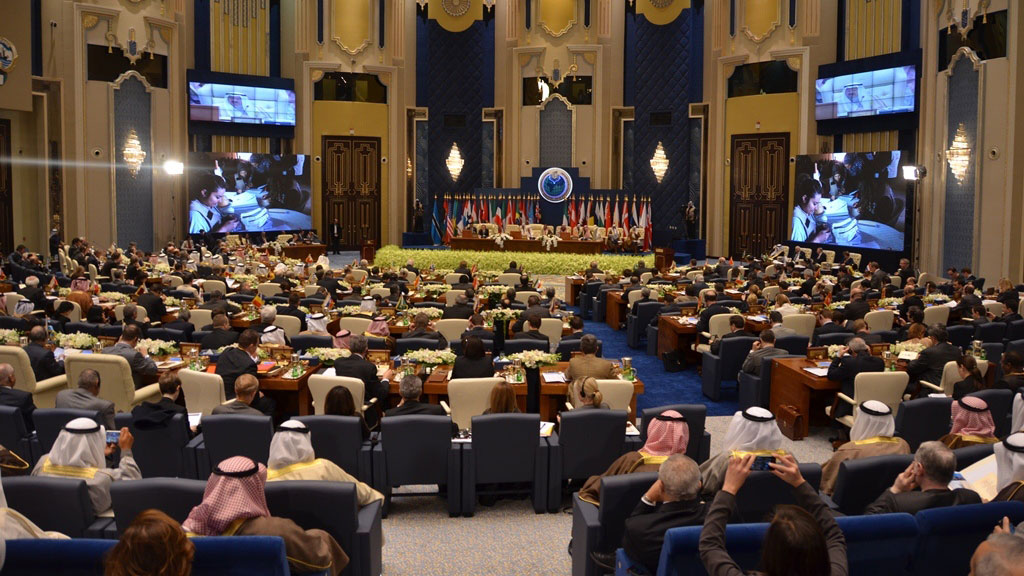“A promise is only a promise until it’s in the bank,” he told IRIN. “It’s exciting to get headline pledges, but it’s important to make sure that money translates on the ground.”
He shared his idea at the Dubai International Humanitarian Aid & Development (DIHAD) conference this week, telling participants:
“One thing that would help the whole system would be the establishment of a universally accepted process under which any pledge to spend money was registered, measured, monitored and implemented, because if a politician wins the floors by making a promise, then he must be made to follow it through with the concrete action that was promised.”
The aid community has an increasing number of systems to track how money is spent, but it has few systems to track pledges.
Get it in writing
One model, Duncan said, is the World Bank pledging process used in Yemen last year, when states that collectively pledged US$8 billion in two pledging conferences signed on paper how much they had pledged and what the money would go towards, “so that they can be held to account.”
The brain child of the idea was Wael Zakout, who manages the World Bank’s work in Yemen. With government support, he has created a system whereby donors will meet with government officials every three months - with media present - to report on four sets of figures: the original pledge; the amount that has been programmed (the number of projects to be financed and their amount); the amount in approved programmes, where a project agreement has been signed between the donor and the government; and the amount of money already disbursed. (The Yemeni government is also developing a more detailed database to track projects.)
The first such meeting was held in February and ended with a listing of those donors who had not delivered on their promises, which was then presented to the Friends of Yemen meeting of foreign ministers.
“We are using name-and-shame,” Zakout told IRIN. “That has been very effective.”
“In the past, the countries pledge and don’t deliver and, somehow, nothing happens,” he said. In 2006, for example, donors pledged $4 billion to Yemen, much of which never materialized. With the new approach, he said, “the pledges will not be forgotten.
“I do hope this will become an example for the international community in other contexts.”
Donor transparency groups say that aid pledges are almost never fully realized. Only a fraction of the $9 billion pledged to the Haiti earthquake recovery reportedly ever made it. In late January, the international community pledged more than $1.5 billion in humanitarian aid to Syria, yet UN response plans requiring the same dollar figure remain only 30 percent funded.
Other promises in recent years, described by the anti-poverty group ONE as “welcome but vague”, include: a $50 billion increase in global official development assistance (ODA) promised at the Gleneagles G8 Summit in 2005; $60 billion for health ODA promised at the Heiligendamm G8 Summit in 2007; $20 billion for agriculture and food security committed at the 2009 L’Aquila G8 Summit; and $100 billion for climate finance promised at the Copenhagen climate summit in December 2009.
Agreed principles
Daniel Coppard, director of research and analysis at Development Initiatives, a group which uses data to advocate for better development work, says the more important starting point is garnering support for a set of commonly agreed principles on how pledges should be made, especially in the context of a shift in recent years towards more qualitative than quantitative pledges.
“The type of commitments made continue to be vague and very slippery,” Coppard told IRIN. “The challenge is getting clarity on the commitments made in the first place. That would be the number one priority.”
The Organisation for Economic Co-operation and Development (OECD)’s Development Assistance Committee (DAC) and ONE have both created guidelines for transparent pledges with more clarity on the funding, including: a specific timeline; whether it is additional, and if so, what the baseline is; whether it will be disbursed in a lump sum or over several years; whether it is conditional; its expected outcomes; and a mechanism through which the pledge’s implementation will be monitored. Global Integrity, which advocates transparent and accountable governance, also uses the SMART criteria – Specific, Measurable, Attainable, Relevant and Timely – to measure governments’ commitments. The challenge now is getting widespread support for and use of these guidelines.
The lack of consistency and specificity in pledges has created challenges in monitoring them, even where mechanisms do exist.
For example, the G8 has regular reporting to monitor fulfilment of pledges made at its summits, but spends more time arguing over interpretations of what the commitments were than on whether they were actually fulfilled, Coppard said. The trouble is that commitments are often made by politicians first, and then ministries try to figure out how to implement them, instead of the other way around.
Once pledges are made clearly, there are many ways they can be monitored, through both civil society and formal mechanisms, for example: a global independent body, domestic mechanisms created through parliament, or mechanisms tied to a specific summit.
One such mechanism is The Mutual Review of Development Effectiveness in Africa (MRDE), an annual report by the UN Economic Commission for Africa and the OECD that assesses progress against commitments made by African governments and the international community. In support of the MRDE, the Commit4Africa website provides a searchable database of pledges made at international summits over the last decade or so (it is out-of-date due to a lack of funding, but hopes to soon be revived).
“This thinking is already well underway,” Coppard said. “A discussion around having some kind of accountability mechanism will force these issues into the open even more.”
ha/rz
This article was produced by IRIN News while it was part of the United Nations Office for the Coordination of Humanitarian Affairs. Please send queries on copyright or liability to the UN. For more information: https://shop.un.org/rights-permissions




